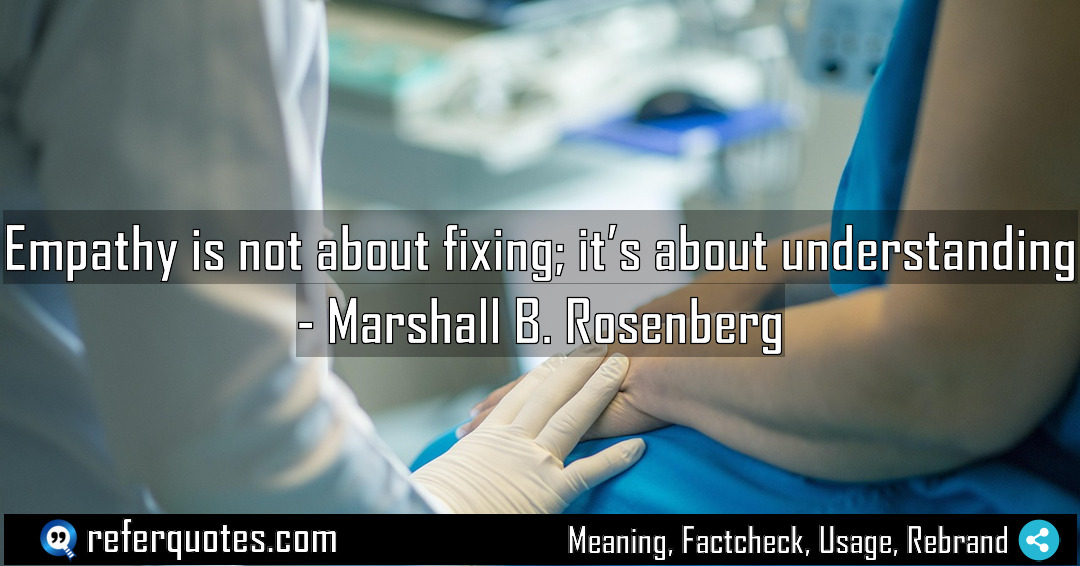
Empathy is not about fixing; it’s about understanding. This simple shift in perspective, from problem-solver to compassionate listener, is the absolute bedrock of genuine connection. It’s a game-changer for anyone in a relationship, whether with kids, partners, or colleagues.
Share Image Quote:
Table of Contents
Meaning
The core message here is a radical one: true empathy is an act of presence, not prescription. It’s about connecting with the feeling and need in someone else’s world, not rushing in with a toolbelt to repair it.
Explanation
Look, we’re all hardwired to fix things. Someone comes to us with a problem, and our brain immediately starts scanning for solutions. But Rosenberg is telling us to just… stop. When you jump to fixing, you’re essentially saying, “I can’t handle your discomfort, so let’s make it go away.” But real empathy? It sits with that discomfort. It listens. It says, “Tell me more. I’m here with you.” It’s about validating their experience, not invalidating it by immediately trying to change it. This is where real trust is built.
Quote Summary
Reading Level64
Aesthetic Score86
Origin & Factcheck
This wisdom comes straight from Marshall B. Rosenberg’s 2005 book, “Raising Children Compassionately,” which is part of his larger body of work on Nonviolent Communication (NVC) developed in the United States. You sometimes see similar sentiments floating around, but this phrasing is uniquely his.
Attribution Summary
Where is this quotation located?
| Quotation | Empathy is not about fixing; it’s about understanding |
| Book Details | Publication Year/Date: 2004; ISBN/Unique Identifier: 9781892005140; Last edition: PuddleDancer Press, 1st Edition, 48 pages. |
| Where is it? | Chapter: The Practice of Empathy, Approximate page from 2005 edition |
Context
Rosenberg places this idea squarely in the parent-child dynamic. He saw that when our kids are upset, our first instinct is often to lecture, correct, or solve. But that just shuts them down. He argues that by simply understanding their feelings and needs first—before any “parenting” happens—we create a connection that makes everything else possible.
Usage Examples
So how does this look in the wild? Let me give you a couple of scenarios.
For Parents: Your kid comes home crying because they weren’t picked for the team. Instead of saying, “Well, you just need to practice more,” (fixing) you try, “Wow, that sounds so disappointing. You were really looking forward to it, huh?” (understanding). See the shift? You’re joining them in their world.
For Managers: An employee is frustrated with a project. Instead of re-delegating tasks (fixing), you say, “It sounds like you’re feeling overwhelmed because you need more support on the backend.” You’re identifying the underlying need, which is the real key.
For Partners: Your spouse is venting about a tough day. Instead of offering a list of solutions, you simply hold their hand and say, “That sounds incredibly hard. I’m just going to listen.” The goal is connection, not resolution.
To whom it appeals?
Share This Quote Image & Motivate
Motivation Score81
Popularity Score74
Shareability Score80
Common Questions
Question: So does this mean I should never try to fix a problem?
Answer: Not at all! The magic is in the order. Understanding *first*. Once someone feels truly heard and understood, they are infinitely more receptive to solutions, and often, they’ve already figured out their own.
Question: But what if someone is asking me directly for advice?
Answer: Great question. Even then, it’s powerful to first check for understanding. You can say, “Just so I’m sure I get it, you’re feeling stuck because X and Y, and you need a way to do Z. Is that right?” Then, your advice will be laser-targeted.
Question: This feels passive. Isn’t fixing more productive?
Answer: It feels that way, but it’s an illusion. Unheard problems fester and recur. A “fix” imposed without understanding often creates a new problem. Taking the time to understand is the most productive thing you can do. It builds the relational capital for everything that follows.
Similar Quotes
You know, “Empathy is the bridge between words and understanding” is one of those lines that just sticks with you. It perfectly captures why some conversations flow and others just…
Empathy allows us to understand without needing to agree. It’s a game-changing concept that separates true connection from simple debate. When you grasp this, your conversations transform from battles into…
Empathy is not agreement is one of those concepts that completely changes how you communicate. It’s the key to de-escalating conflict and truly hearing what someone is saying, without feeling…
Empathy is not something we do… it’s something we are. This distinction from Rosenberg is absolutely foundational. It changes the entire game from performance to presence. Table of Contents Meaning…
Empathy doesn’t mean agreement; it means understanding. This is one of those concepts that completely reframes how you connect with people. It’s not about giving in, it’s about tuning in.…
